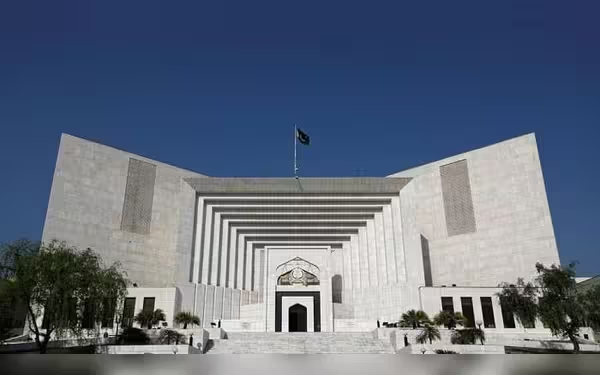Wednesday, January 15, 2025 05:30 AM
Pti Challenges Elections Bill In Supreme Court
- PTI files petition against Elections (Second Amendment) Bill, 2024.
- Bill restricts independent candidates from changing party affiliations.
- Legal battle could reshape Pakistan's political dynamics.
 Image Credits: thenews
Image Credits: thenewsPTI challenges the Elections (Second Amendment) Bill, 2024 in Supreme Court, raising concerns over political representation and independent candidates' rights.
ISLAMABAD: The political landscape in Pakistan is witnessing significant turmoil as the Pakistan Tehreek-e-Insaf (PTI) has taken a bold step by filing a petition in the Supreme Court against the recently passed Elections (Second Amendment) Bill, 2024. This legislation, which was approved by both the National Assembly and the Senate, is perceived by the PTI as an attempt to undermine the Supreme Court's ruling from July 12 regarding reserved seats for political parties. The PTI, led by Chairman Gohar Khan, argues that this bill should be declared "null and void" as it poses a direct threat to their political standing and the rights of independent candidates.
The Elections (Second Amendment) Bill, introduced by Pakistan Muslim League-Nawaz (PML-N) lawmaker Bilal Azhar Kiyani, has sparked fierce opposition. The bill includes provisions that would prevent independent candidates from switching party affiliations after the elections, which PTI claims would hinder their ability to regain representation in the assemblies. Following a Supreme Court ruling that deemed PTI eligible for reserved seats, the Election Commission of Pakistan (ECP) recognized 93 lawmakers from various provincial legislatures as PTI members, further intensifying the stakes involved.
During discussions in the National Assembly, PTI MNA Ali Muhammad Khan criticized the government's intentions, suggesting that the bill was designed to "attack" the Supreme Court. Gohar Khan echoed these sentiments, emphasizing that while Parliament holds significant power, the ultimate authority to interpret laws lies with the Supreme Court. In contrast, Federal Law Minister Azam Nazeer Tarar defended the bill, asserting that it was drafted prior to the Supreme Court's decision and aimed to clarify electoral processes.
The Elections (Second Amendment) Bill proposes several key changes, including amendments to Sections 66 and 104 of the Elections Act 2017. These changes stipulate that candidates must declare their party affiliation before seeking election symbols, and if a political party fails to submit its list for reserved seats on time, it will lose eligibility for those seats. Additionally, a new provision, Section 104A, makes the consent of independent candidates to join a political party "irrevocable," preventing any changes after submission.
As the situation unfolds, the implications of this legislation could reshape the political dynamics in Pakistan. The PTI's legal challenge highlights the ongoing struggle between political parties and the judiciary, raising questions about the balance of power in the country. The outcome of this case will not only affect the PTI but could also set a precedent for future electoral laws and the rights of independent candidates.
The PTI's move to challenge the Elections (Second Amendment) Bill in the Supreme Court underscores the contentious nature of Pakistan's political environment. As the nation watches closely, the resolution of this legal battle will be crucial in determining the future of political representation and the integrity of the electoral process in Pakistan.













